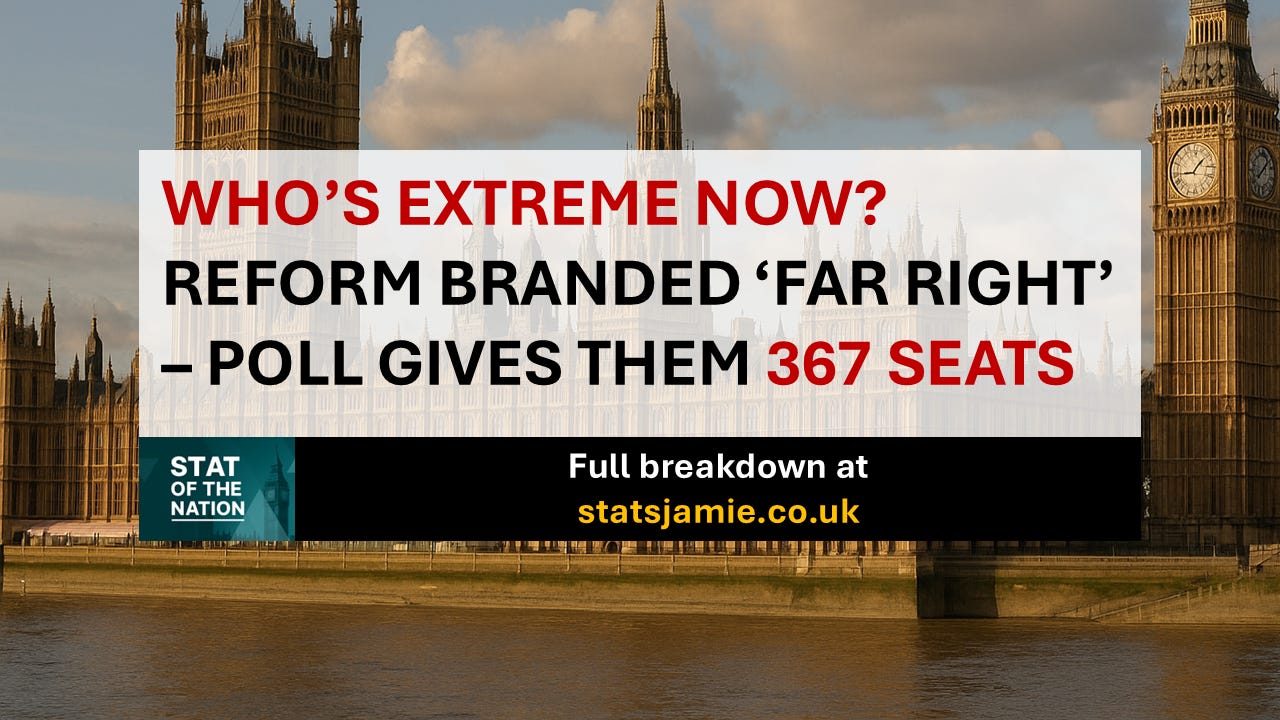Who’s Extreme Now? Reform Branded ‘Far-Right’ — Poll Gives Them 367 Seats
Reform UK would win 367 Westminster seats — a majority of 84 — while Labour and the Conservatives collapse. The data show who’s really out of touch with Britain.
A new MRP poll from Electoral Calculus has turned Westminster upside down — and demolished one of the laziest lines in British politics.
Reform UK, constantly branded “far-right” by pundits and politicians who should know better, now leads the country on 36% of the vote. That’s not a fringe movement. That’s the mainstream.
The Numbers that Change Everything
Based on fieldwork from 10–18 September (sample ~7,400):
🟦 Reform UK – 36% → 367 seats (majority 84)
🔴 Labour – 21% → 117 seats
🔵 Conservative – 15% → 24 seats
🟠 Liberal Democrat – 10% → 58 seats
🟣 Your Party (Corbyn’s) – 4% → 13 seats
🟢 Green – 6, SNP – 42, Plaid Cymru – 5
Even under tactical voting scenarios, Reform still wins outright.
Without it, they’d take a landslide — 445 seats — the largest parliamentary majority in decades.
What Matters to Voters
This poll didn’t just ask who people support — it asked why.
And the answers show how far removed Westminster has become from the country it governs.
Across the electorate:
💷 59% say the cost of living and economy are their top concern
🧳 51% cite immigration and border control
🏥 45% list the NHS and health care
Among Reform voters, immigration ranks highest (90%), but economic pressures and NHS performance still feature strongly. Among Labour voters, the economy and NHS dominate. Among Conservatives, the pattern is virtually identical.
In short, the differences are minor. Everyone’s worried about the same core issues — money, migration, and the state of public services.
That’s not a “far-right” agenda.
It’s mainstream Britain talking about everyday realities: bills, jobs, housing, and fairness. When the political establishment calls that “extreme”, it says more about them than about voters.
The Regional Picture
While Reform leads nationally, the regional breakdown reveals a striking pattern.
Support is strongest across England’s heartlands — the Midlands, North, and South West — where Reform consistently polls between 37% and 48%.
That’s not a protest vote. It’s a nationwide movement.
In Wales and Scotland, Reform’s share is lower — around 27% and 19% respectively — but that’s largely due to the presence of nationalist parties competing for the same anti-establishment space.
Even so, the model still projects Reform to win 26 of Wales’s 32 seats — extraordinary in a country where Labour have dominated for decades.
And if, in Wales, Reform are polling at almost double Plaid Cymru’s support for a Westminster election, how can they seriously be labelled “far-right” by Plaid politicians?
The numbers simply don’t back up the rhetoric. Reform’s rise isn’t fringe — it’s mainstream. It reflects ordinary voters rejecting the status quo, not embracing extremism.
You can read my earlier analysis on this trend — “29% of Welsh Voters Back Reform UK” — here.
The Establishment’s Blind Spot
If millions of voters now back Reform, the idea that they’ve all simultaneously become “radical” or “dangerous” doesn’t pass the laugh test. The truth is simpler — and more uncomfortable for the political class: The centre ground has moved, but the establishment hasn’t noticed.
Labour talks about “rebuilding trust” while piling on tax and debt. The Conservatives still think invoking 2019 will save them. And the commentariat sneers at the electorate instead of listening to them.
The Real Extremes
The real extremism isn’t in voters asking for border control or economic competence — it’s in a political system that ignores both. Calling half the country “far-right” isn’t analysis; it’s denial.
Britain isn’t lurching to the right. It’s pulling the political elite back to the middle — common-sense economics, controlled migration, and fairness for working taxpayers.
Final Thought
This poll isn’t just about numbers.
It’s a mirror held up to Westminster.
And what it shows is this:
🔹 The “far-right” label has lost all meaning.
🔹 Ordinary voters have become the new mainstream.
🔹 It’s the people still clinging to the old narrative who’ve drifted to the extremes.
Reform’s rise isn’t the story of a radical Britain.
It’s the story of a normal Britain, finally saying it’s had enough.
✍️ Jamie Jenkins
Stat of the Nation exists to cut through the spin and show the numbers as they are.
If you value clear, fact-driven analysis — please share this roundup with others. And hit subscribe below to get the stats first, every week.
📲 Follow me here for more daily updates:


